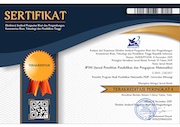Kontribusi Kemampuan Penalaran dan Self-Efficacy terhadap Kemampuan Pemecahan Masalah Siswa
Abstract
References
Bandura, A. (1993). Perceived Self-Efficacy in Cognitif Development and Funtioning. Educational Psychologist, 28(2), 117–148. https://doi.org/10.1207/s15326985ep2802_3
Bloom, B. S. (1956). Taxonomy of Educational Objectives. David McKay Company. https://doi.org/10.1300/J104v03n01_03
Gibson, J. L., Ivanacevich, J. M., Donnely, J. H., & Konopaske, R. (2012). Organizations Behavior, Structure, Process. McGraw-Hill Irwin.
Hadiat, H. L., & Karyati. (2018). The Relation between Curiosity , Self-efficacy and Student ’ Mathematical Reasoning Ability. 5th ICRIEMS Proceedings, Published by Faculty Of Mathematics And Natural Sciences, 263–270.
Jackson, J. W. (2002). Enhancing self-efficacy and learning performance. Journal of Experimental Education, 70(3), 243–254. https://doi.org/10.1080/00220970209599508
Kaur, B., & Toh, T. L. (2012). Reasoning, Communication and Connections in Mathematics. Reasoning, Communication and Connections in Mathematics, 1–10. https://doi.org/10.1142/8466
Konita, M., Asikin, M., & Noor Asih, T. S. (2019). Kemampuan Penalaran Matematis dalam Model Pembelajaran Connecting, Organizing, Reflecting, Extending (CORE). PRISMA,Prosiding Seminar Nasional Matematika, 2, 611–615.
Kurnia, R. D. M., Mulyani, I., Rohaeti, E. E., & Fitrianna, A. Y. (2008). Hubungan Antara Kemandirian Belajar dan Self Efficacy Terhadap Kemampuan. Jurnal Imiah Pendidikan Matematika, 3(1), 59–64.
Lestari, S. A. P. (2019). Mathematical reasoning ability in relations and function using the problem solving approach. Journal of Physics: Conference Series, 1188(1). https://doi.org/10.1088/1742-6596/1188/1/012065
Nursyahidah, F., Saputro, B. A., & Rubowo, M. R. (2018). A Secondary Student’s Problem Solving Ability in Learning Based on Realistic Mathematics with Ethnomathematics. JRAMathEdu (Journal of Research and Advances in Mathematics Education), 3(1), 13. https://doi.org/10.23917/jramathedu.v3i1.5607
Pimta, S., Tayruakham, S., & Nuangchale, P. (2009). Factors Influencing Mathematic Problem-Solving Ability of Sixth Grade Students. Journal of Social Sciences, 5(4), 381–385. https://doi.org/10.3844/jssp.2009.381.385
Pratiwi, D., Suendarti, M., & Hasbullah. (2019). Pengaruh Efikasi Diri dan Kemandirian Belajar Terhadap Kemampuan Pemecahan Masalah Matematika. Jurnal Kajian Pendidikan Matematika, 5(1), 1–14.
Randhawa, G. (2004). Self-Efficacy and Work Performance : An Empirical Study. Indian Journal of Industrial Relations, 39(3), 336–346. https://www.jstor.org/stable/27767910
Setiawan, B., & Supiandi, M. I. (2019). The Contribution of Metacognitive Skills and Reasoning Skills on Problem Solving Ability Based on Problem Based Learning (PBL) Model. Anatolian Journal of Education, 3(2), 75–86. https://doi.org/10.29333/aje.2018.327a
Slameto. (2013). Belajar dan Faktor-Faktor yang Mempengaruhinya. PT Rineka Cipta.
Somawati, S. (2018). Peran Efikasi Diri ( Self Efficacy ) terhadap Kemampuan Pemecahan Masalah Matematika. Jurnal Konseling Dan Pendidikan, 6(1), 39–45.
Vatutin, A., Moskalenko, M., Skryabin, M., Svintsov, M., & Trifanov, A. (2021). Computational Psychometric Approach for Assessing Mathematical Problem-Solving Skills. Procedia Computer Science, 193, 250–255. https://doi.org/10.1016/j.procs.2021.10.025
Zamnah, L. N. (2019). The Relationship Between Mathematical Problem Solving Ability and Self-Efficacy. Daya Matematis: Jurnal Inovasi Pendidikan Matematika, 7(2), 139. https://doi.org/10.26858/jds.v7i2.9811
DOI: https://doi.org/10.37058/jp3m.v8i2.5215
Refbacks
- There are currently no refbacks.
©2017 JP3M (Jurnal Penelitian Pendidikan dan Pengajaran Matematika)
Program Studi Pendidikan Matematika
Fakultas Keguruan dan Ilmu PendidikanÂ
Universitas Siliwangi
Jl. Siliwangi No. 24 Kota Tasikmalaya - 46115
email: jp3m@unsil.ac.id
e-ISSN: 2581-2807 ; p-ISSN: 2460-8599

This work is licensed under a Creative Commons Attribution-NonCommercial-ShareAlike 4.0 International License.
StatCounter:
Detail


